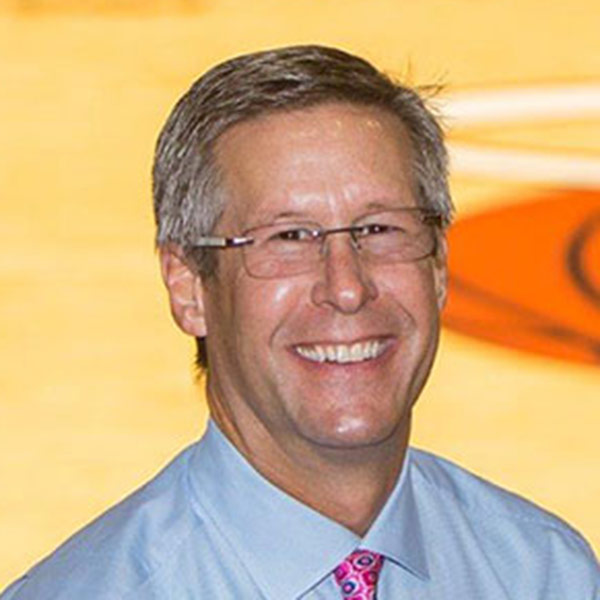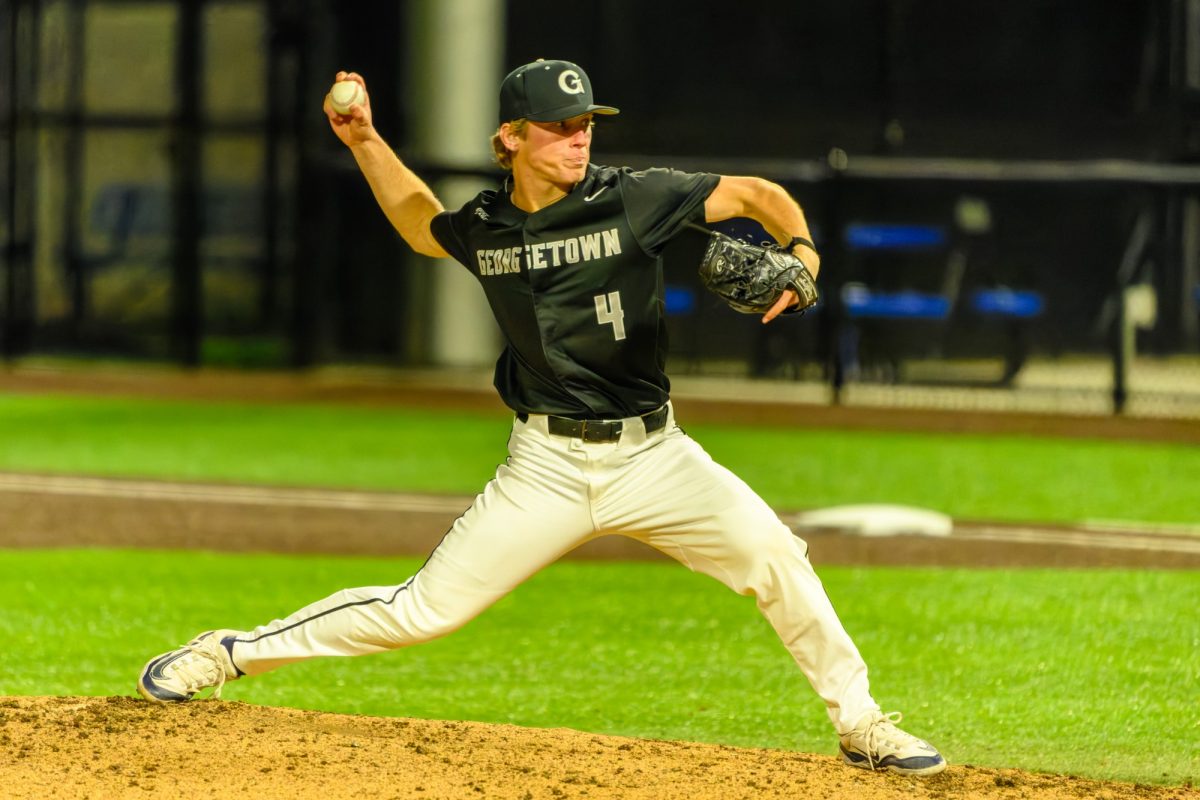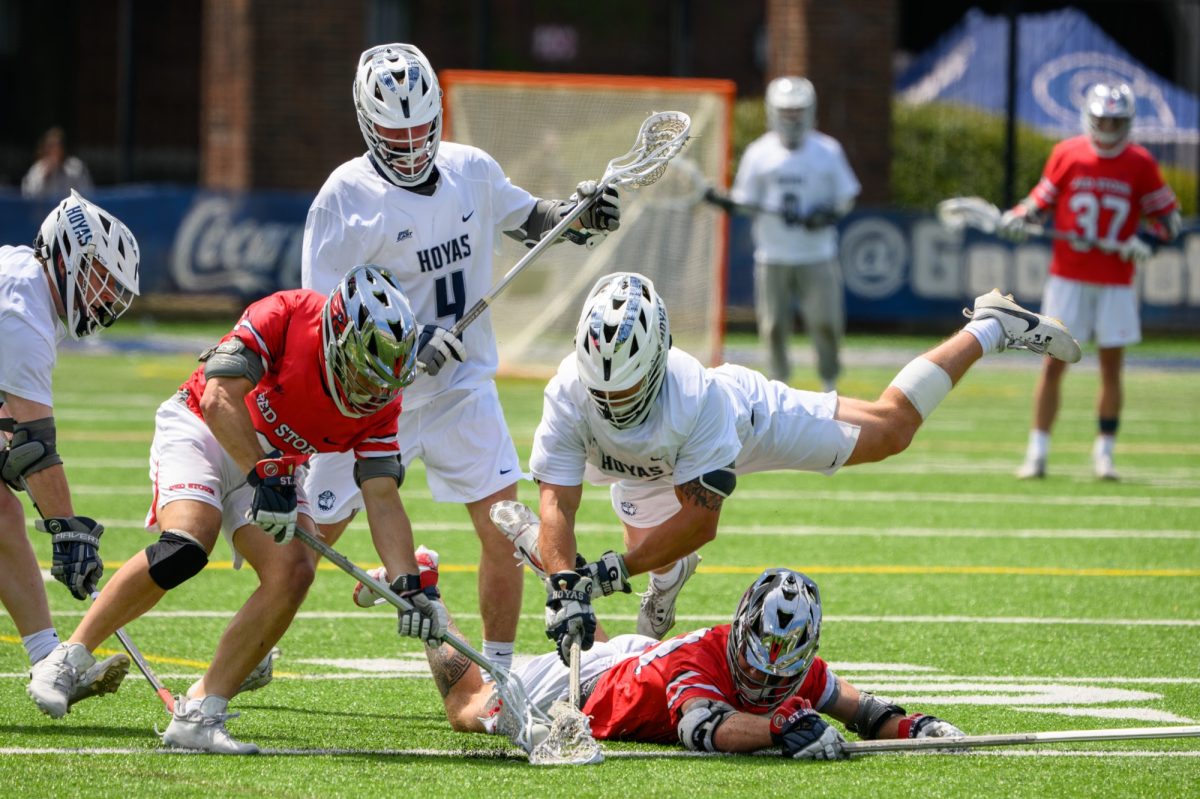Eric Woolworth’s (CAS ’87, LAW ’91) interest in basketball dates back to his early days as a Georgetown University student in the 1980s, watching Patrick Ewing (CAS ’85), Dikembe Mutombo (SLL ’91) and Alonzo Mourning (COL ’92) lead the Hoyas to national prominence. While Woolworth did not originally intend to enter the sports industry since he was never a basketball player himself, he has ended up at the helm of one of the NBA’s most successful franchises in the modern era.
Woolworth has been a part of the Miami Heat organization since 1995, when he began as legal counsel after the team’s acquisition by Micky Arison, then-CEO of the Carnival Corporation. Woolworth took over as the president of business operations for the Heat in 2000. During his time with the organization, the Heat have constructed a new arena, AmericanAirlines Arena, become a regular playoff presence and won three NBA championships.
You attended Georgetown during the golden era of Georgetown basketball. Do you have any favorite memories from watching the basketball team during that time?
I definitely was there during the golden era. My freshman year we won the championship. My sophomore year, we lost in the championship. I have two particular memories, and I went to a lot of games. I think everybody did back then. One was obviously winning the championship; it was almost surreal to be on campus. We went down off the campus into Georgetown, and we literally stopped traffic at the intersection of Wisconsin Avenue and M Street. People just left their cars; they could not move. Everybody just got out of their cars and into the bars. Back then, the drinking age was still 18. It was one of the most insane parties I’ve ever been to in my life. Every bar was packed, rolling in and out of them. The whole place was going crazy. People were leaning on their horns. It was really, really fun. The other was we had a snowstorm, and I don’t remember if it was freshman year or sophomore year, but definitely Patrick was still there. We used to play out at the [Capital] Centre in Maryland during that era, but instead of going out to the Cap Centre, the visiting team, which was Providence, was already in town. And so we played the game at McDonough [Arena], and only students were let in. I don’t know what McDonough’s capacity is — 1,200 or 1,500 — and it was all students, and it was like the greatest basketball game you could ever want.
Do you think Georgetown would benefit from having its own basketball stadium on campus?
I think it’d be great. My son just graduated last May, so I’ve spent a lot of time on campus the last four years. I don’t know where you’d put it, but it would be fantastic, and I’m always in favor of that kind of thing.
You were a Georgetown student with Patrick Ewing and Dikembe Mutombo and then worked for the Heat while Alonzo Mourning played there; you have ties to all three great Georgetown centers. What have you noticed these three have in common?
They’re really good guys. I think that’s one of the hallmarks of Georgetown’s program. These guys have all done a ton of things for their communities. They’ve all remembered where they came from. The things Dikembe’s done in Africa, the things Alonzo does here in the community in Miami, I know Patrick’s done a lot of stuff in Charlotte, now in [Washington], D.C., and in New York when he was there. I think they are very civic-minded, really good citizens of the world, and I think it’s something Georgetown should be proud of.
What advice would you have for current Georgetown students who have an interest in pursuing front office positions at Georgetown?
The sports and entertainment world are a whole lot bigger — the sports world is much bigger than the professional leagues in this country. There’s golf, there’s tennis, there’s the NCAA. There’s not just the big broadcast networks like ESPN, but there’s lots of regional sports networks. There are media jobs, there are jobs in foreign countries — rugby, soccer, agencies. The sports and entertainment world is bigger than young people tend to think it is, and there’s a lot of different ways to get experience if your ultimate goal is to get hired by one of the teams or one of the leagues — whether that’s basketball, football, baseball. There’s a lot of different ways in the door, and getting some experience is important.

What prompted you to pursue a career in the NBA?
I graduated from Georgetown and then worked in New York City for a year and realized that I missed academia. So I went back to Georgetown law school and got a law degree and practiced law in D.C. for about five years after law school, but then the opportunity to work for the Heat kind of fell into my lap. My father-in-law [Howard Frank] was at the time the COO of the Carnival Corporation. He ultimately went on to become the vice chairman, and so Micky Arison, who was the CEO and chairman of Carnival, was actually at my wedding. I met him early on and he bought the Heat in 1995. And I thought to myself, ‘Now that would be interesting.’ I just called him up and asked him, ‘I don’t know the first thing about sports law, but I’ve always loved sports, and if you need any help, please let me know.’ And he just laughed. He said, ‘I don’t know the first thing about owning a sports team, but I could use somebody that I could trust, so why don’t you come down?’ And I started as general counsel about two months later. I was the first person to be hired. I’ve been with the Heat since 1995. I was general counsel for five years, and I’ve been running the business since 2000. I have three NBA championship rings, but I still can’t dribble a basketball with my left hand.
What do you do as president of the Heat? What are your job responsibilities?
The way most teams work these days is you’ve got somebody running the basketball and somebody running the business. Pat Riley runs all our basketball operations, and I run all the business operations, so sales, marketing, customer service, all the backhouse things, legal, finance, HR, IT — increasingly important. And I run the arena as well, so all the concerts and events that we host at the arena that we can’t host while we’re in quarantine. It’s not the best time to be running a business who’s predicated on 20,000 people gathering right now. I’m in charge of everything you don’t see with the players — everything else falls under my offices.
What did you learn at Georgetown that you’ve used in your current job?
I learned a lot at Georgetown, and I’m not talking about academics. I’m just talking about people. The Georgetown campus is a really diverse community, and I don’t just mean that in terms of the different religions and people of color and that nature. There are people from all over the world that attend Georgetown, whether it’s because of the [School of Foreign Service] or just because it’s in D.C., and the capital of our country attracts people from other countries. But my eyes were opened at Georgetown and to the big wide world out there — the fact that different people from different cultures need to figure out how to get along. The best class I ever took has nothing to do with my major, which was American government, but it was a class on the Arab-Israeli conflict. And I think there were 21 kids in the class: 10 kids of Jewish descent, 10 kids of Arab descent and me. And it was the most fascinating way to spend a couple hours a couple times a week that you could ever imagine. And we read books from different points of view and had really lively debates. In some instances, it was tense and certainly intense, but it never was anything other than professional, and it was just an amazing experience — the kind of experience that every college kid should have. There are things like that you get at Georgetown that you can’t get anywhere else.
What distinguishes the Heat from other NBA teams?
We’ve been really successful since Pat Riley came in about four or five months after I did, and during that time I think only the San Antonio Spurs have made more playoff appearances than we have. It’s been a really successful run, and we have built a reputation on the business side as well as the basketball side as being one of the best-run organizations across any number of different disciplines — marketing, certainly on the leading edge of the data analytics revolution in our industry. We were the team that — a couple years ago the NBA decided to start giving out a diversity and inclusion award — and we got the first-ever diversity and inclusion award.
How did you choose to build AmericanAirlines Arena? What went into creating a new stadium?
Our industry is sort of interesting. There’s a school of thought that says that you build your arena, and then you operate it for some number of years, and then you do a complete overhaul and pump in a couple hundred million dollars. We’ve taken the opposite operating philosophy. Every summer, we’re making a significant investment in the facility to keep it fresh and new, and when our fans come back the next year, they get surprised and delighted by something they weren’t expecting or didn’t see before. There’s new additions every year, new food and beverage opportunities every year, and whether it’s new seats or new LEDs, we’re constantly upgrading our facilities so we feel like, although our facility is 20 years old, it feels like it’s two years old. It feels like a new facility because of the way we treated it. I think it’s been a successful operating philosophy for us.
When do you anticipate the return of the NBA and with what changes?
Plans are being made to get competition going at the end of this summer, probably at the end of July. We’re still trying to figure out how many teams and what the format will be, but I think there’ll be a few games, and then we’ll get into the playoffs and we’ll be able to crown a champion for the 2020 season. But that’s going to be played at a neutral site and with no fans. Our focus is really already on the 2021 season from a business perspective. Basketball people are focused on finishing this season, but from a business perspective, we’re focused now on 2021 and trying to make sure that we are looking at everything we do under a new lens. Social distancing — there’s only so much you can do with social distancing. You’re still going to have to sit next to each other, but there’s certainly things we can do with food safety. We already were the first arena in the league to go cashless and paperless. We’re looking at other contactless things we can do in terms of the way we line people up and the way people get food, things like that. It’s been an interesting exercise. We’ve been looking at a lot of new cleaning products and disinfectants and sanitizers. When we get ready to invite fans back into our facility, we want to make sure that people feel good about coming. That’s kind of our focus at the moment.




















